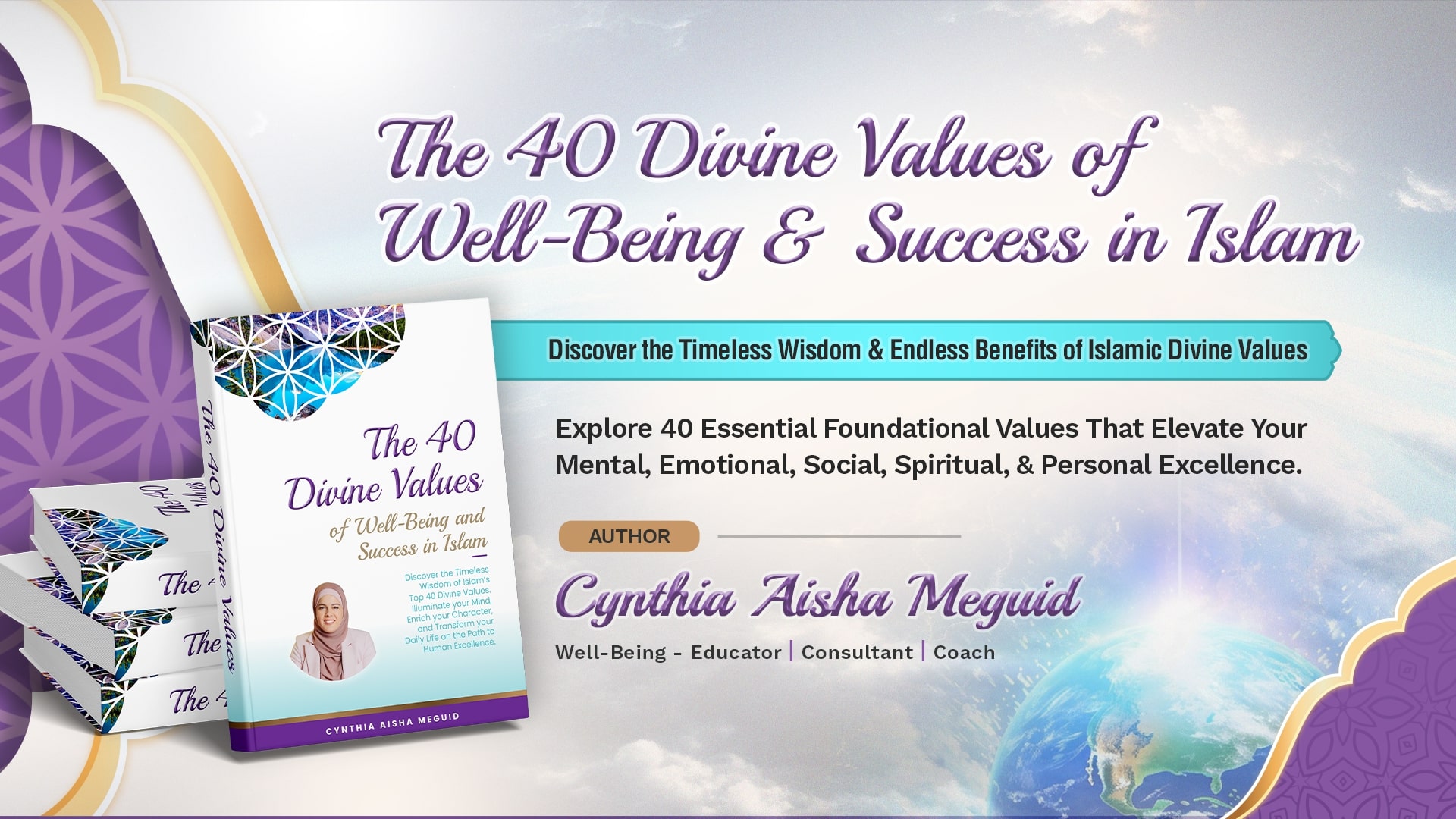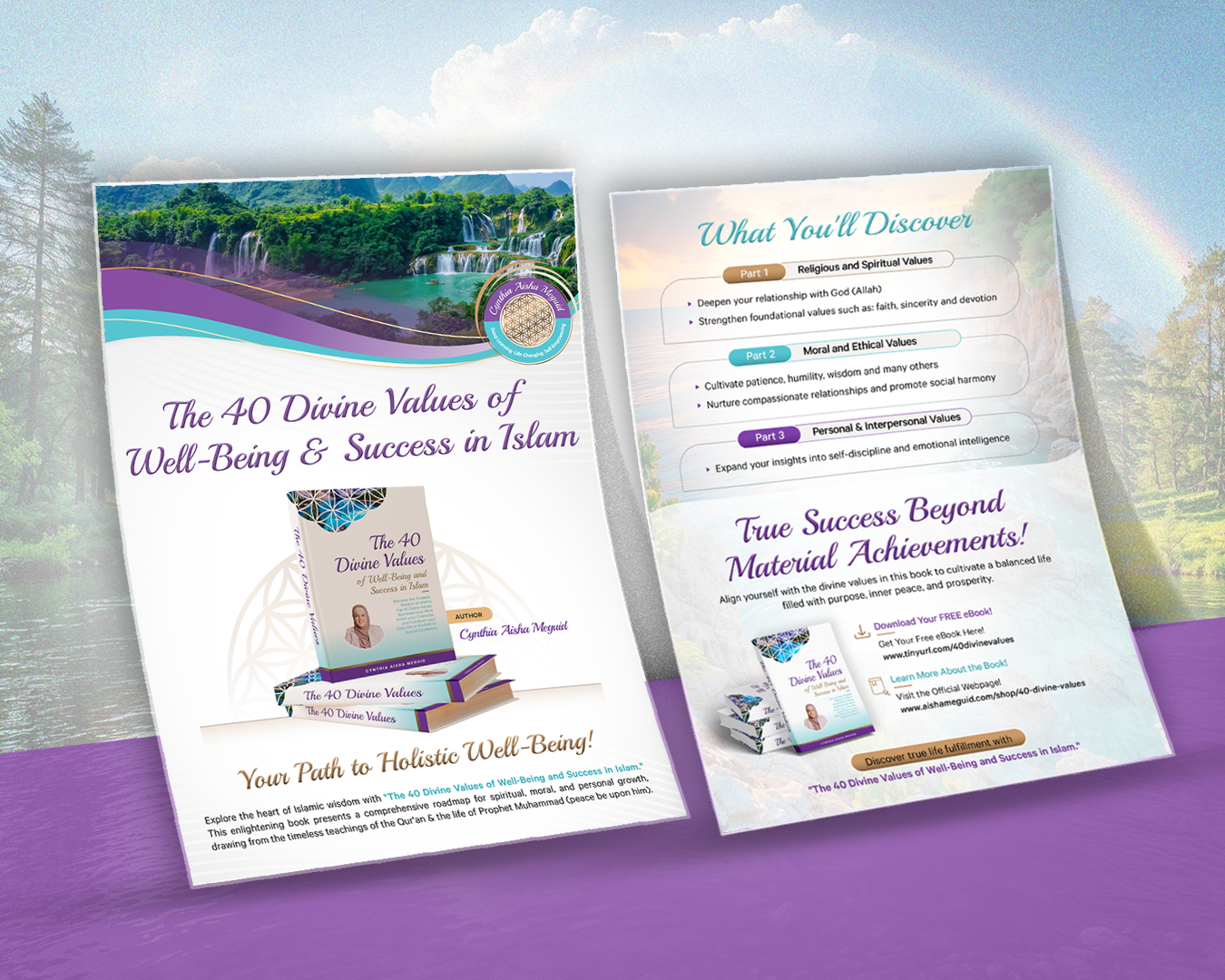
Build Your Life founded on Divine Excellence
Discover the timeless wisdom of Islamic Divine Values. Explore 40 of Islam's most essential values foundational for mental, emotional, social, spiritual, and personal excellence.
Who is this book for?
For Non-Muslims – This book is an invitation to explore the enduring benefits of Islamic Divine Values and understand how they surpass ordinary human-constructed values in offering deeper meaning and purpose. These divine principles provide a clear path to understanding the true essence of life and humanity, offering insights that go beyond the limitations of human reasoning.
For Muslims – This book offers a fresh, in-depth exploration of Islamic values, guiding you toward your highest well-being in all areas of life. It is an opportunity to nourish your life with greater peace and purpose, grow in divine wisdom, and elevate your spirituality.
Why a Book about Values?
The Power of Values: Values Define Our Lives & Drive Our Success and Fulfillment
Values are the deep roots of every thought, intention, emotion, behavior, and habit—like the roots of a tree, they anchor and shape our entire existence. Whether we are conscious of them or not, our values determine every aspect of our lives:
- Our daily choices and decisions
- Our goals and aspirations
- Our emotional, mental, social, and spiritual habits
- How we spend our time and what we prioritize
In essence, the quality of our lives is directly linked to the quality of our values and how effectively we live by them.
Download Official Book Flyer! Front page – Back page

The 40 Divine Values of Well-Being and Success in Islam presents an in-depth exploration into the heart of Islamic wisdom, offering readers a pathway to holistic well-being and success through the timeless teachings of the Qur’an and the life of Prophet Muhammad (peace be upon him). This unique book unveils 40 Divine Values that provide a comprehensive roadmap for spiritual, moral, and personal growth.
Book Summary
Divided into three parts, the book begins with religious and spiritual values, guiding readers toward a deeper relationship with God (Allah). Foundational Islamic values of faith, sincerity, devotion and others shape a life centred on divine purpose and mindfulness, where every thought, word, and action is imbued with a sense of closeness to Allah (God).
In the second section, the book transitions into moral and ethical values, highlighting essential principles like patience, humility, and wisdom. These values are crucial for nurturing compassionate relationships with ourselves and others, promoting justice, and fostering social harmony. By embracing these ethics, we not only refine our own character but also contribute to the well-being of society.
Finally, the third section delves into personal and interpersonal values, offering readers practical insights for self-discipline, emotional intelligence, and community building. Here, the emphasis is on personal excellence and resilience, demonstrating that true success is achieved when individual development is linked with social responsibility and the upliftment of others.
Available FREE on Google Play Books

About the Author
Cynthia Aisha Meguid
Cynthia Aisha Meguid is a well-being teacher, educator, consultant, and coach for over 20 years.
Her mission has been to support others to excel in their values, character and life-skills. Her expertise includes the most advanced methodologies in Personal Development, Self-Improvement, Islamic and Spiritual Development, Applied Positive Psychology and Neuro Linguistic Programming.
She runs courses, workshops, trainings, and events for individuals and youth in these various areas.
Her website www.aishameguid.com, offers you additional resources, support, and guidance in your journey to excellence in psychological, emotional, social, and spiritual life.
Summary of key qualifications – Bachelor of Arts Degree, Sydney Univ 1994, Graduate Diploma in Education UWS 1996, Graduate Certificate in Neuro Linguistic Programming 2007, Masters Degree in Islamic Studies, Charles Sturt Univ 2019, Masters Degree in Applied Positive Psychology, Melbourne Univ. 2021.
The Structure of this Book
This book is organized into 40 chapters, each dedicated to an essential Islamic value. In each chapter, you will find:
A comprehensive Islamic definition of the value
Three thought-provoking Qur’anic verses related to the value, accompanied by brief commentary
Three inspirational narrations (hadiths) from Prophet Muhammad (pbuh) connected to the value, with insightful commentary
Three illuminating Prophetic stories that exemplify the value in action
The Theme of this Book: Well-Being through Holistic Divine Values
Well-being in Islam encompasses a holistic and comprehensive understanding that extends beyond physical health to include spiritual, mental, emotional, and social dimensions.
Below is a summary of key aspects of well-being in Islamic teachings, as explained in more detail in this book.

Spiritual Well-Being:
Connection with Allah (God): The foundation of well-being in Islam is establishing a strong, ongoing, and sincere connection with Allah. This occurs through regular acts of worship, such as prayer, fasting, and reflection, to nourish and strengthen the soul. Spiritual well-being is fundamental to deep inner contentment and fulfillment that flows into our other dimensions.
Fulfillment of Religious Obligations: Well-being is directly linked to fulfilling religious/spiritual duties, which ensure individuals reap abundant benefits. Religious and spiritual acts form the foundation of a deeply meaningful and purposeful life.

Moral and Ethical Well-Being:
Adherence to Islamic Ethics: Well-being in Islam is associated with leading a life guided by Islamic ethics and morality. This includes the Islamic concepts of honesty, integrity, compassion, and justice in all personal and social conduct aspects. Following the moral example of Prophet Muhammad (peace be upon him) is considered integral to achieving ethical well-being.
Avoidance of Sinful Behaviour: Well-being in Islam involves avoiding actions that are considered harmful or sinful. This includes refraining from lying, cheating, and engaging in behaviors that compromise moral integrity.

Social Well-Being:
Positive Relationships: Islam emphasizes maintaining strong family ties and fostering positive relationships. Well-being is linked to the quality of our social connections, and Islam encourages us to contribute to social harmony, support others in various ways, and engage in acts of kindness.
Community Service and Charity: Engaging in acts of charity (sadaqah) and community service promotes social well-being. Contributing to the welfare of others, particularly those in need, is a key aspect of a fulfilling and socially responsible life as a Muslim.

Mental and Emotional Well-Being:
Gratitude and Contentment: Mental and emotional well-being in Islam is associated with cultivating daily the habits of gratitude (shukr) and contentment (qana'ah). Recognizing and appreciating the blessings Allah (God) provides, contribute to a positive mindset and emotional resilience.
Mindful Living: Islam encourages believers to be aware of their daily thoughts and actions. Practices taught by the Prophet (pbuh), such as reflection, supplication, and seeking forgiveness, are beneficial for maintaining mental and emotional balance.

Balanced Living:
Moderation: Islamic well-being is connected to a balanced and moderate lifestyle. Prophetic teachings encourage moderation in all aspects of life, including diet, sleep, work, and recreation. Avoiding excesses and adopting a balanced approach contribute to physical health and overall well-being.
Self-Care: Taking care of one's physical health, including regular exercise, proper nutrition, and sufficient rest, was practiced by the Prophet (pbuh) and is emphasized in Islam. Well-being includes recognizing the body as a trust from Allah and maintaining it in good condition.
In summary, well-being in Islamic teachings is a comprehensive concept that integrates spiritual, moral, social, and physical dimensions. It emphasizes a balanced and purposeful life guided by Islamic principles, promoting individual happiness and the welfare of the family, community and society.
Read your FREE copy today on Google Play Books
- Available in digital eBook (Colour)
- ISBN 9780645675177
- 230 page illustrated eBook
- Categories – Integrates Islamic /religious values with personal development.
- Amazon/Kindle e-reader for e-books, is downloadable & FREE (for PC or mobiles). Link details are auto-generated after purchase.



